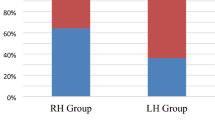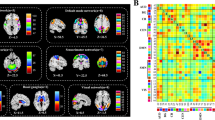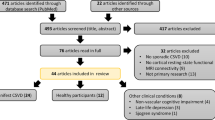Abstract
Independent component analysis (ICA) or seed based approaches (SBA) in functional magnetic resonance imaging blood oxygenation level dependent (BOLD) data became widely applied tools to identify functionally connected, large scale brain networks. Differences between task conditions as well as specific alterations of the networks in patients as compared to healthy controls were reported. However, BOLD lacks the possibility of quantifying absolute network metabolic activity, which is of particular interest in the case of pathological alterations. In contrast, arterial spin labeling (ASL) techniques allow quantifying absolute cerebral blood flow (CBF) in rest and in task-related conditions. In this study, we explored the ability of identifying networks in ASL data using ICA and to quantify network activity in terms of absolute CBF values. Moreover, we compared the results to SBA and performed a test–retest analysis. Twelve healthy young subjects performed a fingertapping block-design experiment. During the task pseudo-continuous ASL was measured. After CBF quantification the individual datasets were concatenated and subjected to the ICA algorithm. ICA proved capable to identify the somato-motor and the default mode network. Moreover, absolute network CBF within the separate networks during either condition could be quantified. We could demonstrate that using ICA and SBA functional connectivity analysis is feasible and robust in ASL-CBF data. CBF functional connectivity is a novel approach that opens a new strategy to evaluate differences of network activity in terms of absolute network CBF and thus allows quantifying inter-individual differences in the resting state and task-related activations and deactivations.





Similar content being viewed by others
References
Beckmann CF, DeLuca M, Devlin JT, Smith SM (2005) Investigations into resting-state connectivity using independent component analysis. Philos Trans R Soc Lond B 360(1457):1001–1013
Biswal B, Yetkin FZ, Haughton VM, Hyde JS (1995) Functional connectivity in the motor cortex of resting human brain using echo-planar MRI. Magn Reson Med 34(4):537–541
Biswal BB, Van Kylen J, Hyde JS (1997) Simultaneous assessment of flow and BOLD signals in resting-state functional connectivity maps. NMR Biomed 10(4–5):165–170
Bokkers RP, van Laar PJ, van de Ven KC, Kapelle LJ, Klijn CJ, Hendrikse J (2008) Arterial spin-labeling MR imaging measurements of timing parameters in patients with a carotid artery occlusion. AJNR Am J Neuroradiol 29(9):1698–1703
Bokkers RP, Bremmer JP, van Berckel BN, Lammertsma AA, Hendrikse J, Pluim JP, Kappelle LJ, Boellaard R, Klijn CJ (2010) Arterial spin labeling perfusion MRI at multiple delay times: a correlative study with H(2)(15)O positron emission tomography in patients with symptomatic carotid artery occlusion. J Cereb Blood Flow Metab 30(1):222–229
Broyd SJ, Demanuele C, Debener S, Helps SK, James CJ, Sonuga-Barke EJ (2009) Default-mode brain dysfunction in mental disorders: a systematic review. Neurosci Biobehav Rev 33(3):279–296
Buckner RL, Andrews-Hanna JR, Schacter DL (2008) The brain’s default network: anatomy, function, and relevance to disease. Ann N Y Acad Sci 1124:1–38
Buxton RB, Uludag K, Dubowitz DJ, Liu TT (2004) Modeling the hemodynamic response to brain activation. Neuroimage 23(Suppl 1):S220–S233
Calhoun VD, Adali T, Pearlson GD, Pekar JJ (2001) A method for making group inferences from functional MRI data using independent component analysis. Hum Brain Mapp 14(3):140–151
Calhoun VD, Adali T, Pekar JJ (2004) A method for comparing group fMRI data using independent component analysis: application to visual, motor and visuomotor tasks. Magn Reson Imaging 22(9):1181–1191
Chuang KH, van Gelderen P, Merkle H, Bodurka J, Ikonomidou VN, Koretsky AP, Duyn JH, Talagala SL (2008) Mapping resting-state functional connectivity using perfusion MRI. Neuroimage 40(4):1595–1605
Cole DM, Smith SM, Beckmann CF (2010) Advances and pitfalls in the analysis and interpretation of resting-state FMRI data. Front Syst Neurosci 4:8
Colebatch JG, Deiber MP, Passingham RE, Friston KJ, Frackowiak RS (1991) Regional cerebral blood flow during voluntary arm and hand movements in human subjects. J Neurophysiol 65(6):1392–1401
Dai W, Garcia D, de Bazelaire C, Alsop DC (2008) Continuous flow-driven inversion for arterial spin labeling using pulsed radio frequency and gradient fields. Magn Reson Med 60(6):1488–1497
Dai W, Varma G, Scheidegger R, Shankaranarayanan A, Schlaug G, Alsop D (2012) Resting fluctuations in volumetric arterial spin labeling. In: Proceedings of the international society of magnetic resonance in medicine, Melbourne, 2012
Damoiseaux JS, Rombouts SA, Barkhof F, Scheltens P, Stam CJ, Smith SM, Beckmann CF (2006) Consistent resting-state networks across healthy subjects. Proc Natl Acad Sci USA 103(37):13848–13853
De Luca M, Beckmann CF, De Stefano N, Matthews PM, Smith SM (2006) fMRI resting state networks define distinct modes of long-distance interactions in the human brain. Neuroimage 29(4):1359–1367
Detre JA, Leigh JS, Williams DS, Koretsky AP (1992) Perfusion imaging. Magn Reson Med 23(1):37–45
Donahue MJ, Blicher JU, Ostergaard L, Feinberg DA, MacIntosh BJ, Miller KL, Gunther M, Jezzard P (2009) Cerebral blood flow, blood volume, and oxygen metabolism dynamics in human visual and motor cortex as measured by whole-brain multi-modal magnetic resonance imaging. J Cereb Blood Flow Metab 29(11):1856–1866
Duong TQ, Kim DS, Ugurbil K, Kim SG (2001) Localized cerebral blood flow response at submillimeter columnar resolution. Proc Natl Acad Sci USA 98(19):10904–10909
Erhardt EB, Rachakonda S, Bedrick EJ, Allen EA, Adali T, Calhoun VD (2010) Comparison of multi-subject ICA methods for analysis of fMRI data. Hum Brain Mapp 32(12):2075–2095
Esposito F, Scarabino T, Hyvarinen A, Himberg J, Formisano E, Comani S, Tedeschi G, Goebel R, Seifritz E, Di Salle F (2005) Independent component analysis of fMRI group studies by self-organizing clustering. Neuroimage 25(1):193–205
Esposito F, Bertolino A, Scarabino T, Latorre V, Blasi G, Popolizio T, Tedeschi G, Cirillo S, Goebel R, Di Salle F (2006) Independent component model of the default-mode brain function: assessing the impact of active thinking. Brain Res Bull 70(4–6):263–269
Federspiel A, Muller TJ, Horn H, Kiefer C, Strik WK (2006) Comparison of spatial and temporal pattern for fMRI obtained with BOLD and arterial spin labeling. J Neural Transm 113(10):1403–1415
Fernandez-Seara MA, Edlow BL, Hoang A, Wang J, Feinberg DA, Detre JA (2008) Minimizing acquisition time of arterial spin labeling at 3T. Magn Reson Med 59(6):1467–1471
Fox MD, Snyder AZ, Vincent JL, Corbetta M, Van Essen DC, Raichle ME (2005) The human brain is intrinsically organized into dynamic, anticorrelated functional networks. Proc Natl Acad Sci USA 102(27):9673–9678
Greicius M (2008) Resting-state functional connectivity in neuropsychiatric disorders. Curr Opin Neurol 21(4):424–430
Horn H, Jann K, Federspiel A, Walther S, Wiest R, Müller T, Strik WK (2012) Semantic network disconnection in formal thought disorder. Neuropsychobiology 66:14–23
Hyvarinen A, Oja E (2000) Independent component analysis: algorithms and applications. Neural Netw 13(4–5):411–430
Jahanian H, Noll DC, Hernandez-Garcia L (2011) B0 field inhomogeneity considerations in pseudo-continuous arterial spin labeling (pCASL): effects on tagging efficiency and correction strategy. NMR Biomed 4(10):1202–1209
Jann K, Dierks T, Boesch C, Kottlow M, Strik W, Koenig T (2009) BOLD correlates of EEG alpha phase-locking and the fMRI default mode network. Neuroimage 45(3):903–916
Jann K, Koenig T, Dierks T, Boesch C, Federspiel A (2010a) Association of individual resting state EEG alpha frequency and cerebral blood flow. Neuroimage 51(1):365–372
Jann K, Kottlow M, Dierks T, Boesch C, Koenig T (2010b) Topographic electrophysiological signatures of FMRI resting state networks. PLoS ONE 5(9):e12945
Joel SE, Caffo BS, van Zijl PC, Pekar JJ (2011) On the relationship between seed-based and ICA-based measures of functional connectivity. Magn Reson Med 66(3):644–657
Jung Y, Wong EC, Liu TT (2010) Multiphase pseudocontinuous arterial spin labeling (MP-PCASL) for robust quantification of cerebral blood flow. Magn Reson Med 64(3):799–810
Liang X, Tournier J-D, Masterton R, Connelly A, Calamante F (2011) An improved 3D GRASE pCASL method for whole-brain resting-state functional connectivity. In: Proceedings of the international society of magnetic resonance in medicine, Montreal, 2011
Liang X, Tournier J-D, Masterton R, Connelly A, Calamante F (2012) A k-space sharing 3D GRASE pseudocontinuous ASL method for whole-brain resting-state functional connectivity. Int J Imaging Syst Technol 22:37–43
Liu TT, Wong EC (2005) A signal processing model for arterial spin labeling functional MRI. Neuroimage 24(1):207–215
Lowe MJ, Mock BJ, Sorenson JA (1998) Functional connectivity in single and multislice echoplanar imaging using resting-state fluctuations. Neuroimage 7(2):119–132
Luh WM, Wong EC, Bandettini PA, Hyde JS (1999) QUIPSS II with thin-slice TI1 periodic saturation: a method for improving accuracy of quantitative perfusion imaging using pulsed arterial spin labeling. Magn Reson Med 41(6):1246–1254
Oldfield RC (1971) The assessment and analysis of handedness: the Edinburgh inventory. Neuropsychologia 9(1):97–113
Orosz A, Jann K, Wirth M, Wiest R, Dierks T, Federspiel A (2012) Theta burst TMS increases cerebral blood flow in the primary motor cortex during motor performance as assessed by arterial spin labeling (ASL). Neuroimage 61(3):599–605
Raichle ME, Snyder AZ (2007) A default mode of brain function: a brief history of an evolving idea. Neuroimage 37(4):1083–1090 (discussion 1097–1089)
Raichle ME, MacLeod AM, Snyder AZ, Powers WJ, Gusnard DA, Shulman GL (2001) A default mode of brain function. Proc Natl Acad Sci USA 98(2):676–682
Talairach J, Tournoux P (eds) (1988) Co-planar stereotactic atlas of the human brain. Thieme, New York
Wang J, Aguirre GK, Kimberg DY, Detre JA (2003a) Empirical analyses of null-hypothesis perfusion FMRI data at 1.5 and 4 T. Neuroimage 19(4):1449–1462
Wang J, Aguirre GK, Kimberg DY, Roc AC, Li L, Detre JA (2003b) Arterial spin labeling perfusion fMRI with very low task frequency. Magn Reson Med 49(5):796–802
Wang J, Alsop DC, Song HK, Maldjian JA, Tang K, Salvucci AE, Detre JA (2003c) Arterial transit time imaging with flow encoding arterial spin tagging (FEAST). Magn Reson Med 50(3):599–607
Wang J, Rao H, Wetmore GS, Furlan PM, Korczykowski M, Dinges DF, Detre JA (2005) Perfusion functional MRI reveals cerebral blood flow pattern under psychological stress. Proc Natl Acad Sci USA 102(49):17804–17809
Williams DS, Detre JA, Leigh JS, Koretsky AP (1992) Magnetic resonance imaging of perfusion using spin inversion of arterial water. Proc Natl Acad Sci USA 89(1):212–216
Wu WC, Fernandez-Seara M, Detre JA, Wehrli FW, Wang J (2007) A theoretical and experimental investigation of the tagging efficiency of pseudocontinuous arterial spin labeling. Magn Reson Med 58(5):1020–1027
Wu CW, Gu H, Lu H, Stein EA, Chen JH, Yang Y (2009) Mapping functional connectivity based on synchronized CMRO2 fluctuations during the resting state. Neuroimage 45(3):694–701
Wu WC, Jiang SF, Yang SC, Lien SH (2011) Pseudocontinuous arterial spin labeling perfusion magnetic resonance imaging–a normative study of reproducibility in the human brain. Neuroimage 56(3):1244–1250
Xie J, Jezzard P, Okell T, Miller K, Chappell M, Smith S (2011) Resting state network study of quantitative perfusion fluctuations. In: Proceedings of the organization for human brain mapping, Quebec City, 2011
Ye FQ, Berman KF, Ellmore T, Esposito G, van Horn JD, Yang Y, Duyn J, Smith AM, Frank JA, Weinberger DR, McLaughlin AC (2000) H(2)(15)O PET validation of steady-state arterial spin tagging cerebral blood flow measurements in humans. Magn Reson Med 44(3):450–456
Zou Q, Wu CW, Stein EA, Zang Y, Yang Y (2009) Static and dynamic characteristics of cerebral blood flow during the resting state. Neuroimage 48(3):515–524
Author information
Authors and Affiliations
Corresponding author
Rights and permissions
About this article
Cite this article
Jann, K., Orosz, A., Dierks, T. et al. Quantification of Network Perfusion in ASL Cerebral Blood Flow Data with Seed Based and ICA Approaches. Brain Topogr 26, 569–580 (2013). https://doi.org/10.1007/s10548-013-0280-3
Received:
Accepted:
Published:
Issue Date:
DOI: https://doi.org/10.1007/s10548-013-0280-3




